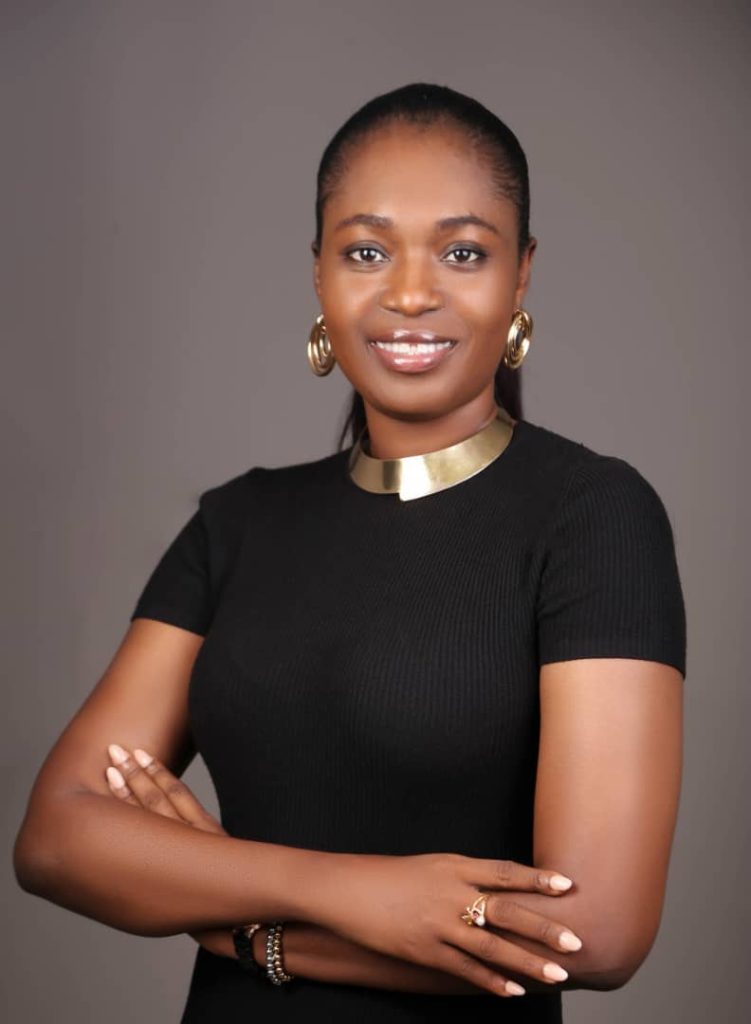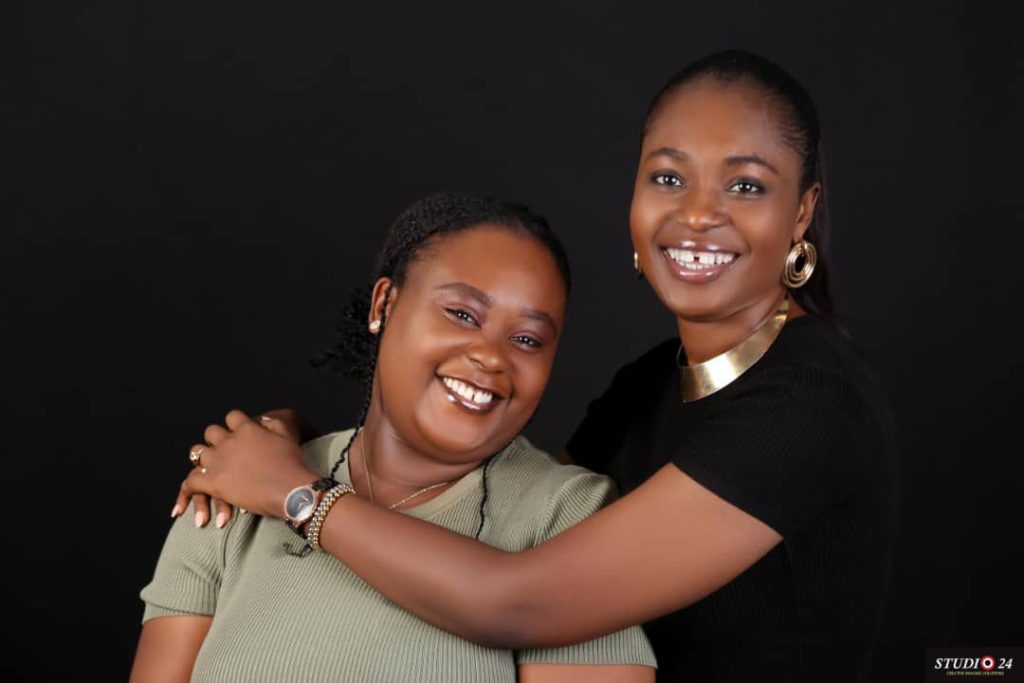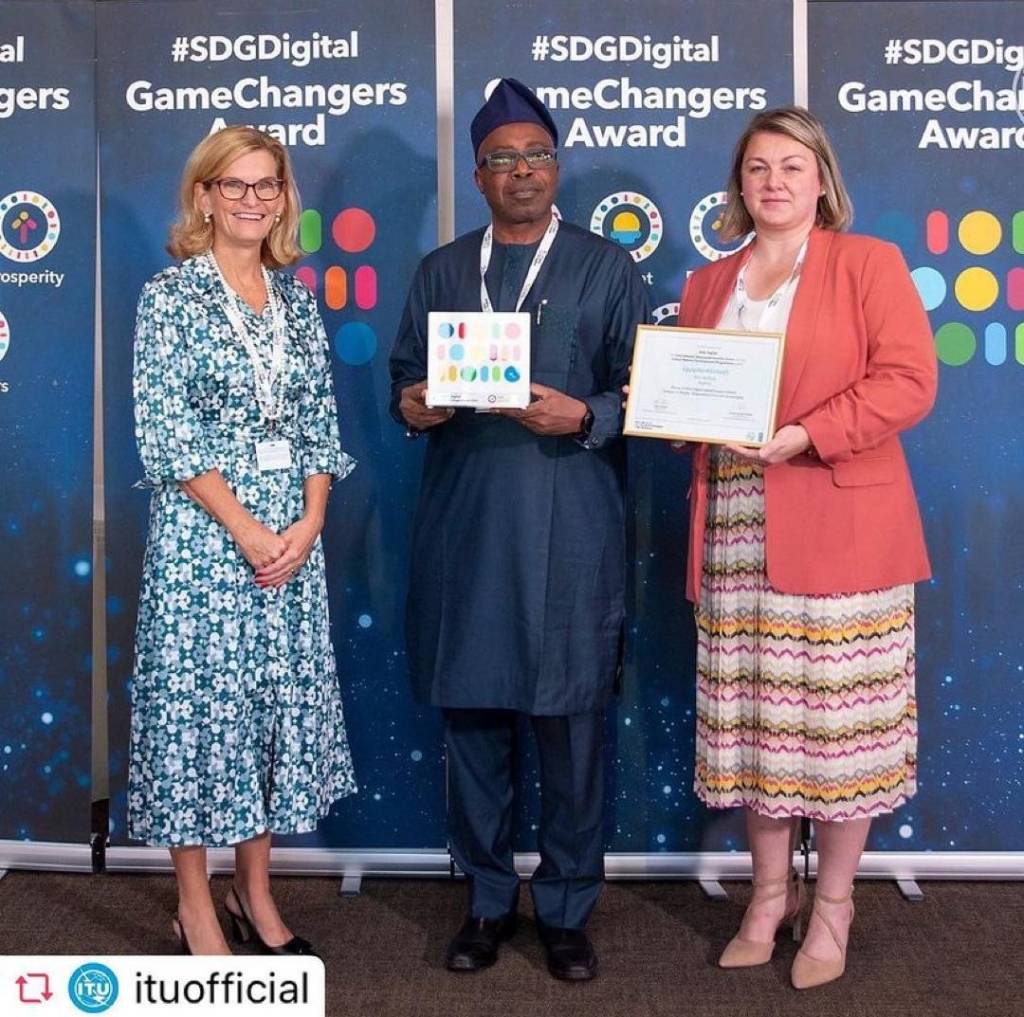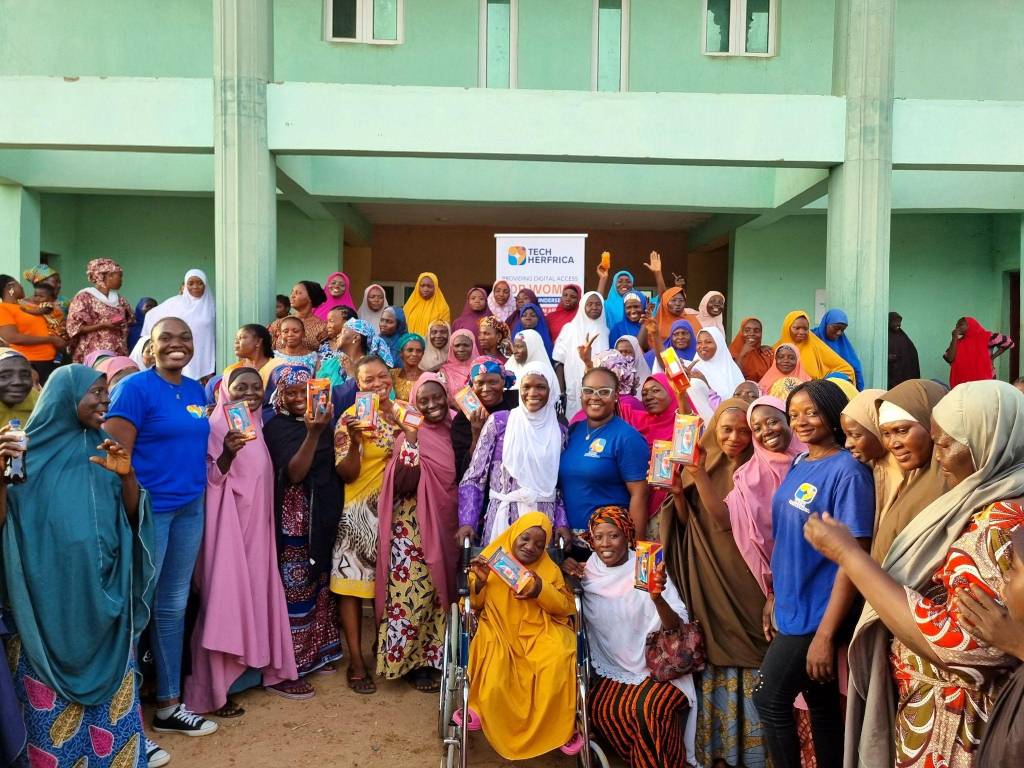Imade Bibowei Osuobeni's Story
Inspiring Social and Economic Transformation for Rural African Women through Digital Inclusion

In late 2022, Imade Bibowei-Osuobeni was “only” a successful public policy expert who had recently returned from London to her native Nigeria. Then in December, she participated in a five-day training in Nigeria organized by the United Nations eTrade for Women, which equipped female digital entrepreneurs and social-impact champions with the knowledge and network to drive business growth.
While Bibowei-Osuobeni was excited to soon apply her new lessons-learned, she also felt fortunate to have this opportunity. That led her to consider the flip-side: How many poor, rural Nigerian women – and women across the African continent – might never benefit from any kind of training. “I remember feeling sad that many low-income women, especially those in rural, remote areas, may never get the opportunity to sit in that room or receive the level of support and skills that we got during the event,” she says. “So, I kept thinking about how I could use all I had learned to help women in those underserved areas.
That moment planted the seed for Bibowei-Osuobeni, to want to spread similar training throughout provincial Nigeria. Perhaps even beyond.Within two months, she’d established Tech Herfrica. In the one year since, this fledgling NGO has so far trained 4,000 Nigerian and Kenyan women ( here ), providing them with digital- and financial-literacy skills – all of it aimed at breaking the cycle of poverty for them, their families and their communities. The NGO has ambitious plans to eventually reach and impact 10 million Africa women – and to make significant progress toward achieving several of the world’s 17 Sustainable Development Goals. Especially, SDG #1 on No Poverty, #2 on Zero Hunger, #4 on Quality Education, #5 Gender Equality, #9 on Industry, Innovation and Infrastructure, #10 on Reduced Inequalities, #11 on Sustainable Cities and Communities, #12 on Responsible Consumption and Production, #17 on Partnership for the Goals.
But the road hasn’t been smooth. A turning-point for Bibowei-Osuobeni came just one month after the UN training, in January 2023, as she traveled through the Nigerian countryside. In Edo State, she stopped in a village to buy foodstuffs. The fruit and vegetables were so fresh, yet so cheap – it would have cost four times as much in Abuja, the city where she now lived. So she stocked up, spending US$100. As the purchase grew larger, the seller, Susan, burst into tears; she’d never before sold that much to a single customer. Intrigued by Susan’s emotional reaction, Imade asked her to explain the challenges she faced in selling her products. As Susan explained, Bibowei-Osuobeni stumbled upon a heartbreaking discovery of the harsh realities and profound impact of digital exclusion in rural communities, particularly on women like Susan.
Susan’s village had a well-developed road network and reliable internet connection, which made Imade wonder why she (Susan) wasn’t using e-commerce to reach more customers and secure better prices for her produce. When asked if she had a smartphone, Susan said no, explaining that she couldn’t afford one and even if she could, she wouldn’t know how to use it for online trading. She lamented that buyers from nearby cities often purchased her produce at extremely low prices, leaving her with very little for her hard work. This saddened Imade as she realized how much access to and knowledge of digital tools like smartphones could transform her situation and help lift her out of poverty. With the insights gained in Lagos still fresh on her mind, Imade immediately started thinking of solutions to help Susan and others like her.
After this encounter with Susan, Imade returned to Abuja and put together a team to design a pilot digital programme that involved sourcing customers in Abuja for Susan, enabling her to sell more of her produce at competitive prices. Imade and her team utilized their WhatsApp statuses to market Susan’s products, and upon receiving orders, they would contact her by phone to arrange for the items to be sent to Abuja. Imade’s team would then collect the goods from the bus station and deliver them to customers. Within just 12 weeks of implementing this strategy, Imade and her team succeeded in multiplying Susan’s income tenfold, empowering her to purchase a smartphone and learn how to utilize it for online trading. This remarkable success story catalyzed further action on a larger scale.
“When I got back to Abuja and we started to facilitate trade, every week Susan was selling products worth over two hundred thousand naira. It was always exciting and fulfilling for us each time we received her calls and that of her husband to thank us for giving them a new lease of life- one where she could afford a smartphone, grow her business, and contribute to caring for her family. This success led us to start thinking about how to scale the programme to reach more women like her.
So she turned to me, her cousin, because she needed someone who could buy into her dream and also someone who could put in that much work for free and so I (Ivie) became the first volunteer for Tech Herfrica. Together, we started doing our research to evaluate the magnitude of the digital divide as it affected rural African women and we discovered a huge gap.

According to the GSMA Customer Survey of 2021, in Nigeria, mobile internet is used by 67% of urban men, 46% of urban women, 41% of rural men, and only 24% of rural women making it impossible for them to reap the benefits of the digital world. We also realized that the issue was not just a lack of digital infrastructure in rural communities, but it was also attributed to the high cost of smartphones, digital illiteracy, and social norms. Once we established the issues, we started thinking about innovative and integrated ways to solve the problems and reach more women.
At this point, Imade knew a team had to be put together. So, she rallied a team of colleagues and associates across the world who she knew could provide the specific skills and knowledge needed. The team wasn’t alone. The next thing was to put out ads for volunteers. Before long, volunteers from 4 different countries were onboard and added their support and international reach to the vision of Tech Herfrica.
Since March 2023, Tech Herfrica has gone ahead to create and implement a holistic program for over 6,391 rural women, girls and youth in Nigeria giving them access to digital and financial literacy training in local languages, access to smartphones, business loans, and local technology to improve productivity. Other Success stories of increase digital and financial literacy and income, as well as business scaleup of women such as Mary, a Widow, and Queen, a struggling low-income trader, representing thousands of women who have benefitted from Tech Herfrcica’s programme can be read here: (link to stories) Tech Herfrica has also co-created an e-commerce solution www.herlocalmarket.com that connects rural female farmers and traders to customers outside their local communities, enabling them to sell more of their products at the right prices, which helps to increase their income and reduce post-harvest waste. Through this approach, buyers get access to affordable food items directly from rural sources, while the sellers earn more for their hard work. Imade’s work in this regard, through Tech Herfrica’s programme led her to receive the Visionary African Woman Award in Ghana- a validation of her commitment to ensuring food security.
Tech Herfrica’s innovative solution, EquipHer4Growth also won the 2023 SDG Digital Game Changers award in the people category- a testament to its impact in improving digital and financial literacy, access to smartphones for connectivity and income for over 4000 rural women in Nigeria. This award also came with a $2000 cash price, which Tech Herfrica utilized to implement the programme for 260 rural women, improving their digital and financial literacy and equipping 20 clusters, comprising 10 women each with smartphones to facilitate ongoing learning and trade. Despite the seeming progress in such a short time, the organization has encountered challenges and learned valuable lessons along the way.

“Upon receiving the award notification, I felt immense joy and a sense of fulfillment, as it validated our impact and hard work. In the months leading up to the award, we had traveled extensively to remote villages, implementing our program and refining its design based on valuable insights gained.”
On what the experience had been so far, Imade said “Initially, we aimed to impact 1 million African women by 2030 through technology-driven scaling, but soon realized that achieving lasting impact required a more thorough approach, not just a focus on numbers. As we implemented the program across 18 communities, we recognized the need for physical training in local languages due to low literacy levels among the women. This led to logistical challenges, including the need for local interpreters and a train-the-trainer model. We also learned the importance of involving male allies to achieve fast adoption.”
Even though the team at Tech Herfrica’s initial approach of distributing phones was individually, they soon realized that this was financially unsustainable, so they transitioned to a cluster model where group leaders(cluster heads) were equipped with smartphones for the use of all members of their groups. This facilitated trade opportunities and continuous learning, allowing the women to eventually afford their own phones. The digital course developed was administered through cluster heads and complemented physical training and supported sustainability.
The cash prize from the SDG Award has long been used in implementing the most cost-effective approach for the over 200 women who benefited from the program. “We are grateful to our partners and donors for their trust and support throughout our journey.”- Imade

Despite the highs and lows, Imade and her team are committed to championing digital inclusion for rural African women, starting with Nigeria. Considering the socioeconomic realities of rural communities across the continent, this appears to be a humongous task, one that requires the right partnerships with government and other local organizations, integrated programmes, and funding. In Imade’s words:
“At Tech Herfrica, we are dedicated to providing digital knowledge and access to 10 million women and girls in rural African communities. Our approach has evolved to focus on scalability, adaptability, and sustainability through the EquipHer4growth program. We use a train-the-trainer model to empower others to replicate our efforts, reducing the need for our physical presence. Thanks to Turn.IO with support from Bill and Melinda Gates foundation, we have also created digital courses tailored for rural women, which can be accessed via WhatsApp. This approach ensures quality control and continuous learning as our trainers can deploy these courses to train other women in their communities. By documenting our processes and forming strategic partnerships with donors, we aim to secure funding to maximize our impact. We invite more partners and donors to join us in equipping rural women with digital and financial literacy skills. This empowerment enables women to make informed decisions, enhance agricultural productivity, and increase their income using basic smartphones, ultimately breaking the cycle of poverty. Our work benefits not only the women directly involved but also helps reduce inequalities across Africa, fostering food security and poverty reduction for a brighter future.”

